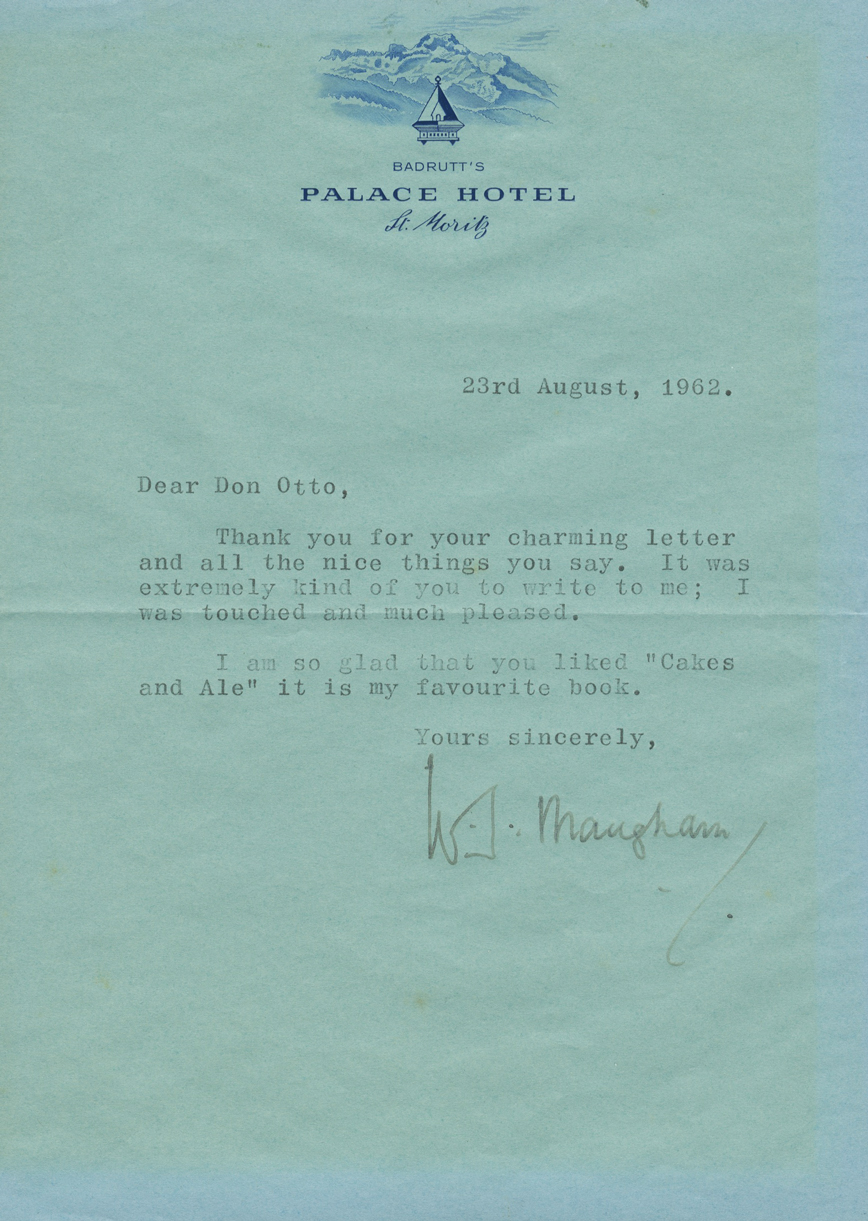W. Somerset Maugham
W. Somerset Maugham
W. Somerset Maugham Typed Letter Signed - 1962
Typed letter signed on light blue Palace Hotel, St. Moritz (Switzerland) stationery, dated 23rd August, 1962, featuring a lovely image of the Swiss Alps in the hotel’s logo. Uniform light toning overall, else fine condition.
In his introduction to a Modern Library edition, published in 1950, Maugham wrote, “I am willing enough to agree with common opinion that Of Human Bondage is my best work… But the book I like best is Cakes and Ale … because in its pages lives for me again the woman with the lovely smile who was the model for Rosie Driffield.”
Maugham writes, in full:
Dear Don Otto,
Thank you for your charming letter and all the nice things you say. It was extremely kind of you to write me; I was touched and much pleased.
I am so glad that you liked “Cakes and Ale” it is my favourite book.
Yours sincerely,
W. S. Maugham
WILLIAM SOMERSET MAUGHAM (1874-1965) was an English playwright, novelist and short story writer. He was one of the most popular authors of his era, and reputedly the highest paid of his profession during the 1930s.
Maugham’s masterpiece is generally agreed to be Of Human Bondage, a semi-autobiographical novel that deals with the life of the main character Philip Carey, who like Maugham, was orphaned, and brought up by his pious uncle. Philip’s clubfoot causes him endless self-consciousness and embarrassment, echoing Maugham’s struggles with his stutter. Later successful novels were also based on real-life characters: The Moon and Sixpence fictionalizes the life of Paul Gauguin; and Cakes and Ale contains thinly veiled characterizations of authors Thomas Hardy and Hugh Walpole. Maugham’s last major novel, The Razor’s Edge, published in 1944, was a departure for him in many ways. While much of the novel takes place in Europe, its main characters are American, not British. The protagonist is a disillusioned veteran of World War I who abandons his wealthy friends and lifestyle, travelling to India seeking enlightenment. The story’s themes of Eastern mysticism and war-weariness struck a chord with readers as World War II waned, and a movie adaptation quickly followed.
Among his short stories, some of the most memorable are those dealing with the lives of Western, mostly British, colonists in the Far East, and are typically concerned with the emotional toll exacted on the colonists by their isolation. Some of his more outstanding works in this genre include Rain, Footprints In The Jungle and The Outstation. Rain, in particular, which charts the moral disintegration of a missionary attempting to convert the Pacific island prostitute Sadie Thompson, has kept its fame and been made into a movie several times. Maugham said that many of his short stories presented themselves to him in the stories he heard during his travels in the outposts of the Empire. He left behind a long string of angry former hosts, and a contemporary anti-Maugham writer retraced his footsteps and wrote a record of his journeys called Gin And Bitters. Maugham’s restrained prose allows him to explore the resulting tensions and passions without appearing melodramatic. His The Magician (1908) is based on British occultist Aleister Crowley.
Maugham was one of the most significant travel writers of the inter-war years, and can be compared with contemporaries such as Evelyn Waugh and Freya Stark. His best efforts in this line include The Gentleman In The Parlour, dealing with a journey through Burma, Siam, Cambodia and Vietnam, and On A Chinese Screen, a series of very brief vignettes which might almost be notes for short stories that were never written.

